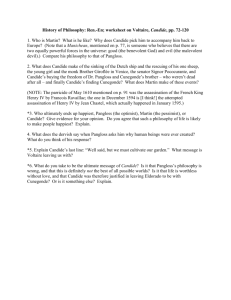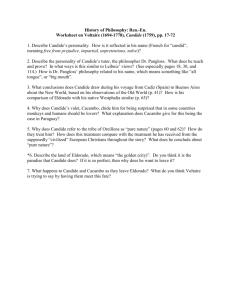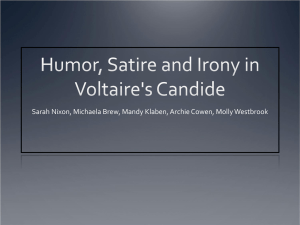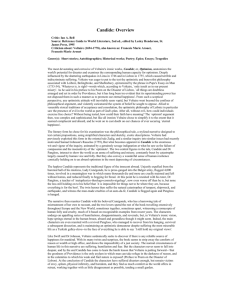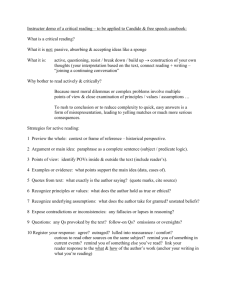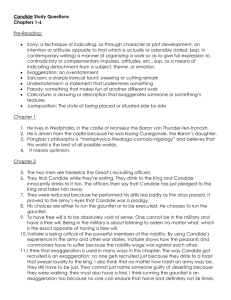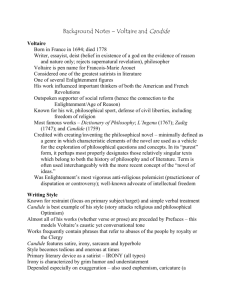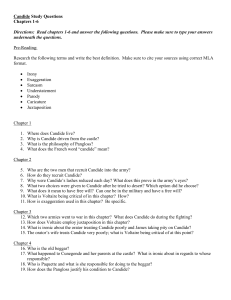Candide Questions - Gull Lake Community Schools
advertisement
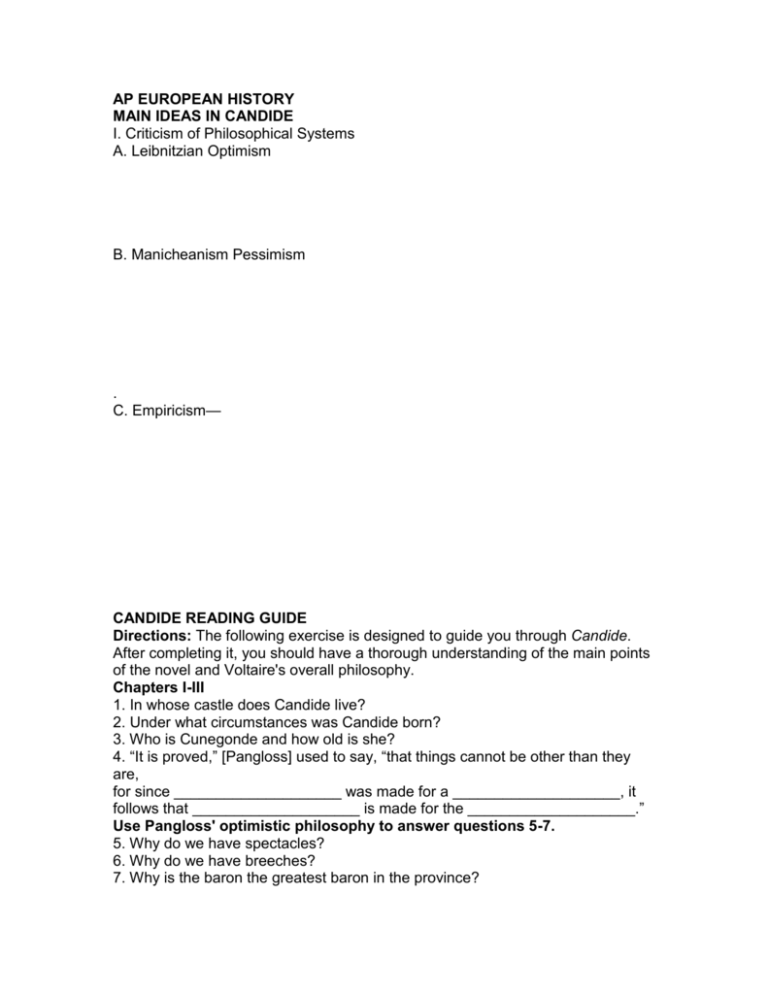
AP EUROPEAN HISTORY MAIN IDEAS IN CANDIDE I. Criticism of Philosophical Systems A. Leibnitzian Optimism B. Manicheanism Pessimism . C. Empiricism— CANDIDE READING GUIDE Directions: The following exercise is designed to guide you through Candide. After completing it, you should have a thorough understanding of the main points of the novel and Voltaire's overall philosophy. Chapters I-III 1. In whose castle does Candide live? 2. Under what circumstances was Candide born? 3. Who is Cunegonde and how old is she? 4. “It is proved,” [Pangloss] used to say, “that things cannot be other than they are, for since ____________________ was made for a ____________________, it follows that ____________________ is made for the ____________________.” Use Pangloss' optimistic philosophy to answer questions 5-7. 5. Why do we have spectacles? 6. Why do we have breeches? 7. Why is the baron the greatest baron in the province? 8. What is meant by “experimental physics” and how does it get Candide literally kicked out of the castle? 9. Name at two techniques that the uniformed men use to get Candide to join the Bulgarian army. 10. How was Candide punished when he tried to go for a walk without permission? What point do you think Voltaire is trying to make about natural rights? 11. Voltaire give a scathing description of the “glories” of war . Name at least two of them. 12. Would the orator be inclined to agree with Pangloss’ philosophy? Chapters IV-VI 13. How does Pangloss’ philosophy backfire on him and on Cunegonde? 14. Voltaire believed that men make their own fates. They are not controlled by some all-powerful God. How does Voltaire make this clear when James states his opposition to Pangloss' philosophy? 15. According to Pangloss, for what purpose was the Lisbon harbor formed? 16. What was the purpose of burning people at the stake in Lisbon? 17. On what charges were Pangloss and Candide arrested? Chapters VII-IX 18. To whom did the old woman take Candide? 19. What relationship do Cunegonde, Don Issachar, and the Grand Inquisitor have? 20. What does Candide do with the Inquisitor when the Inquisitor walks in on Candide and Cunegonde while they are “on the couch.” 21. Now that Pangloss is dead, who becomes the new advisor to Candide and Cunegonde? Chapters X-XII 22. How does Voltaire show the hypocrisy of the clergy? 23. Where does Candide go to find the “best of all possible worlds?” 24. Why did Voltaire choose Urban X to be the old woman's father when he could have chosen any pope? 25/26. . Name two misfortunes that befell the old woman when she was with the Moroccans. 27. For what purpose does Voltaire think religion can be used? Chapters XIII-XVI 28. Pangloss was always very optimistic, but the old woman is more practical. How does she advise Candide to deal with the murder he has committed? 29. Cacambo recommends to Candide that they go to the Jesuits. According to Cacambo, how might Candide be useful to them? 30. From Cacambo's description, the Jesuit community sounds like Utopia—it is vast and orderly. Find something in Cacambo's description that shows that this is not really Utopia (and hence, another criticism of the Church). 31. What is the true identity of the Reverend Father? 32. Why does the Reverend Father become so angry at Candide after treaty him like a friend? 33. By having Candide kill the Reverend Father, Voltaire shows that men are sometimes compelled to do evil things. How does this further refute Pangloss's philosophy? 34. Does the incident involving the monkeys show that man is evolving (ape to man) or that man is devolving (man to ape)? 35. blank 36. How does Voltaire’s description of the Orellians compare to Thomas Hobbes' description of the “state of nature?” Chapter XVII-XIX 37. Read Chapters XVII and XVIII and give three examples of how Eldorado really is Utopia in Voltaire's mind. 38. Cite the page and paragraph in Chapter XVII in which Candide finally admits that Pangloss was wrong. 39. On which figure in the Protestant Reformation is page 80 based? 40. Why does Candide leave Eldorado? 41. How do pages 85-86 illustrate the hypocrisy of Christianity? 42. How do the incidents involving the Dutch captain and the judge refute Pangloss' philosophy? Chapters XX-XXIII 43. How does Martin's philosophy differ from Pangloss' philosophy? 44. What criticism does Martin make of Pangloss' philosophy on pages 91-92? 45. According to Martin, for what purpose was the earth formed? 46. Explain the humor involving the doctors on page 97. 47. How do the incidents described on pages 105-107 illustrate that Candide is very naïve and still has faith in Pangloss' philosophy? 48. Based on the events in Chapter XXIII, does Voltaire agree with Hobbes or Locke? Give evidence 49. Does Voltaire support the British system of government? Give evidence. Chapter XXIV-XXVI 50. Name three things that happened to Paquette after she left Westphalia. 51. How do Paquette's and Giroflée lives compare to Pangloss' philosophy?Which philosophy does Paquette's life best reflect, Pangloss' or Martin's? Give evidence. 52. How does Voltaire's treatment of Milton and the other classics relate to the skepticism of the time? 53. According to divine right theory, kings are ordained by God, a theory that Voltaire does not support. The purpose of Chapter XXVI, therefore, is to demonstrate that even the worst fates can befall kings. Knowing this, explain why the servant want the kings to leave the inn so quickly. Chapters XVII-XXX 54. What does Cunegonde do for a living in Constantinople? 55. Who does Candide discover on the Levantine ship? 56. “I still hold my original views,” replied Pangloss, “because, after all, for I am still a philosopher. It would not be proper for me to ____________________, since____________________ cannot be ____________________; and besides, the ____________________, together with the plenum and subtle matter, is the most beautiful thing in the world.” 57. What does the old woman suggest Candide buy while they wait for their fortunes to take a turn for the better? 58. After the baron again refuses to allow Candide to marry his sister, what does Candide do with him? 59. Searching for the meaning of life, Candide and his friends consult a famous dervish. What religious concept does the dervish reflect? 60. Do Pangloss and Martin change their opinions by then end of the book?
